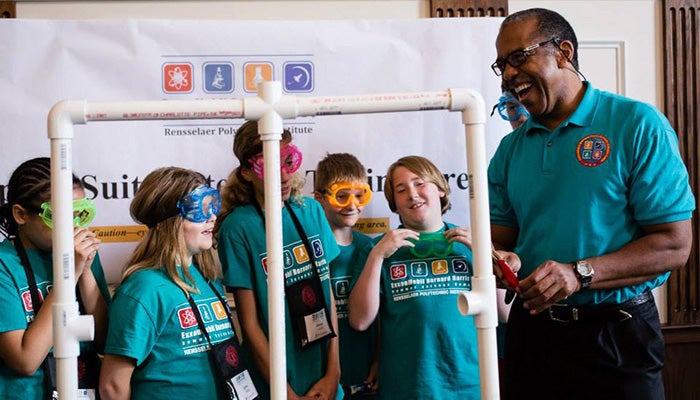 Middle-school students eager to participate in science, technology, engineering, and math (STEM) learning are encouraged to apply for the ExxonMobil Bernard Harris Summer Science Camp experience to be held at 20 universities nationwide. This is the eighth year that Rensselaer has been selected to participate in the program. This year’s theme is “Nanotechnology: It’s a Small, Small World.” The program is being conducted in partnership with the Rensselaer Nanotechnology Center. The camp will be held from June 21 to July 3 on the Rensselaer campus.
Middle-school students eager to participate in science, technology, engineering, and math (STEM) learning are encouraged to apply for the ExxonMobil Bernard Harris Summer Science Camp experience to be held at 20 universities nationwide. This is the eighth year that Rensselaer has been selected to participate in the program. This year’s theme is “Nanotechnology: It’s a Small, Small World.” The program is being conducted in partnership with the Rensselaer Nanotechnology Center. The camp will be held from June 21 to July 3 on the Rensselaer campus.
It is expected that 1,000 aspiring scientists and engineers will be selected to strengthen their STEM knowledge and skills, alongside Dr. Bernard A. Harris Jr., camp founder and the first African-American to walk in space, and other STEM professionals, including ExxonMobil engineers.
Supported by the ExxonMobil Foundation, the program is celebrating a decade of promoting STEM academic excellence. “Through hands-on activities such as building robots and testing space crafts, students have the opportunity to see how science, technology, engineering, and math are integrated with daily life,” said Harris, president of the Harris Foundation.
Throughout the two-week camp, students live on campus and participate in interactive, inquiry-based classes taught by university faculty, secondary school teachers, and STEM educators. Campers also have the opportunity to explore local museums and nature centers − discovering science within their communities.
“At Rensselaer, we understand the important role STEM programs such as these play in preparing students for the high-tech careers of tomorrow,” said Cynthia Smith ’96, assistant dean of students at Rensselaer, director of pipeline initiatives and partnerships, and the director of the ExxonMobil Bernard Harris Summer Science Camp. “Over the years, we have seen incredible enthusiasm and interest from our campers, sparked by the opportunity they have to see science and math at work in the community through the exciting interactive experiments, field excursions, and the core curriculum taught by our highly qualified and motivated teachers.”
 Eligible applicants must be entering the sixth, seventh, or eighth grades in the fall of 2015. According to Smith, a total of 48 middle school students from the 20-county recruitment area, with proven expertise and interest in math and science, and who have successfully completed the application process, will be selected and invited to attend.
Eligible applicants must be entering the sixth, seventh, or eighth grades in the fall of 2015. According to Smith, a total of 48 middle school students from the 20-county recruitment area, with proven expertise and interest in math and science, and who have successfully completed the application process, will be selected and invited to attend.
Students also will hear from local professionals about exciting and diverse careers in STEM fields, where the demand for skilled workers continues to increase. According to the Business Center for a College- and Career-Ready America, almost all of the 30 fastest-growing occupations in the next decade will require at least some background in STEM. Additionally, the U.S. Department of Labor’s Bureau of Labor Statistics anticipates the demand for professionals in a variety of engineering disciplines will continue to grow, with the addition of approximately 250,000 engineering positions over the next 10 years.
“We are honored that Rensselaer was selected this year as a camp host because of its long-standing commitment to math and science education, and its efforts to support and promote local community youth in these disciplines,” Smith said. Rensselaer has received $80,000 from the Harris Foundation to support the program.
“The Bernard Harris Camp Program is a key avenue for students to experience STEM fields at an early age,” said Suzanne McCarron, president of the ExxonMobil Foundation. “Inspiring today’s youth to develop an interest–and ultimately pursue careers–in math, science, and engineering is critical to ensuring that the next generation of leaders is armed with innovative skills to address the challenges of the 21st century.”
Since 2006, more than 9,500 underserved students have participated in this program. According to a 2013 Harris Foundation study of camp alumni, 84 percent of graduating high school participants credit the camp experience for impacting their decision to take STEM-related honors, Pre-Advanced Placement, and/or Advanced Placement classes in high school; 96 percent plan to go to college; and 86 percent plan to pursue a STEM-related career.
More information about the Harris Foundation.


